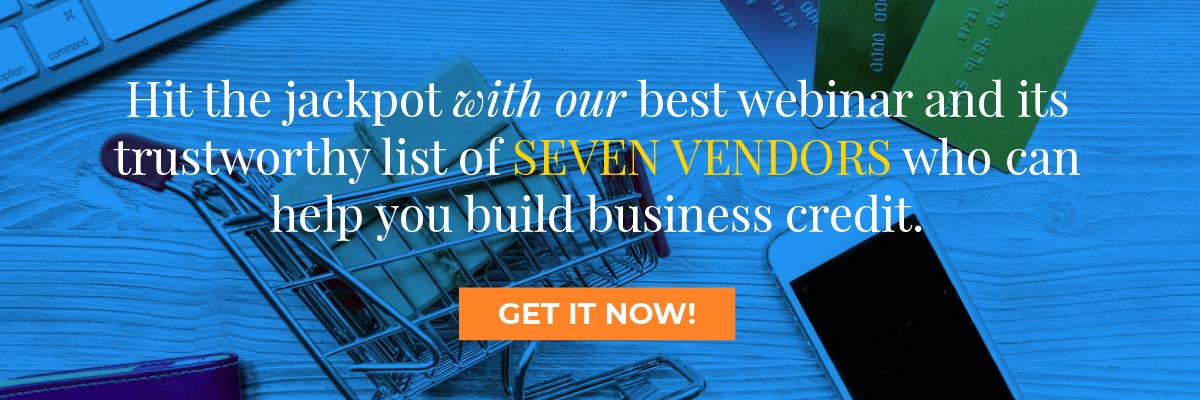- Connect With Us!
- (877) 600-2487
- info@creditsuite.com
How to Get and Read Your FREE Business Credit Reports and Understand Your Score
Published By Faith Stewart at September 8th, 2019
And How to Understand Your Score
Most people know they have a personal credit score. Many business owners do not know, however, that they may have a business credit score. This is a score very similar to your personal FICO, but it is related to your business financial transactions only. It is not connected to your personal finances at all. In fact, business credit reports are not even connected to your social security number.
The problem is, unlike your personal credit reports, it can be difficult to determine what business credit reports have one them. It is easy to get a copy of your FICO report for free. It is not so easy to get free business credit reports.
Where Does Your Business Credit Report Come From?
Just as there are credit reporting agencies for your personal credit score, there are also business credit reporting agencies. The largest one, and the one lenders use most often, is Dun & Bradstreet. However, there are actually several others. The other two most common are Experian and Equifax.
They do not just give out free business credit reports however. In fact, the prices for reports directly from the top 3 most commonly used credit reporting agencies are pretty steep. For example:
Hit the jackpot with our best webinar and its trustworthy list of seven vendors who can help you build business credit.
- Dun & Bradstreet reports range in price from $61 to $229 per report.
- Experian reports are $49.95 per report.
- Equifax is $99.95 per report.
The prices range so broadly due to the varying complexity and detail of the information provided in each report. For example, Dun & Bradstreet has multiple types of scores and a report for each one.
How to See Free Business Credit Reports
The only real way to get free business credit reports is if you are denied a loan based on your business credit. There are ways to see what is on it, one time, for free however.
Nav is a service that will let you see a summary of your credit reports from all three of the major credit reporting agencies. However, these are only summaries, not full free business credit reports. Generally, that means you can see your score, and maybe the accounts you have listed. While this will help you see where you stand, it will not suffice for the purpose of correcting mistakes or even to show you what you need to do to improve your score. You do have the option to pay for more information though.
Free Business Credit Reports: Credit.net
Credit.net does not offer ongoing free business credit reports, you can access a free trial. There is no credit card required, and after you pull the report, you have 30 days to check it out. This means at least once you can get a totally free look at your report, because there is no fear of missing a cancelation deadline and having to pay anyway.
Free Business Credit Reports: Scorely
This is a lesser known credit reporting agency that will let you see your free business credit reports before you pay for an ongoing subscription. Unlike Nav or Credit.net, they are actually calculate their own score similar to the big 3 (Experian, Equifax, and Dun & Bradstreet.) They strive to be totally transparent and to make their reports easy to understand.
Free Business Credit Reports: CreditSafe
You do have to pay for an ongoing subscription to CreditSafe, but they will let you see your free business credit reports to get you started. collect data from over 8,000 sources including:
- FTSE Stock
- Telephone research
- Local Agents
- Companies House
- Gazettes
- Branches
- News
- Trade Payment Data
- Banks
- Courts
- Registry Offices
Of course, this is far less than 8,000, but it gives an idea of the sources they use to gather their information.
It is also another option for a fore business credit reports. If you do subscribe, they have a number of reports that are unique to them. This means you are getting something that you may not get with the other monitoring services or even the standard reports from the Dun & Bradstreet, Experian, or Equifax.
Free Business Credit Reports: Business Loan Denial
As mentioned before, you can get free business credit reports if a lender denies you for a business loan. This is the less fun way to see your business credit reports for free. After denial, you will receive a letter in the mail from the agency that provided the lender with your report. You will have the opportunity to request a free copy of the report that the lender saw, so that you can see why the result was denial. You have 90 days to submit your request.
How To Read Your Business Credit Reports
Each reporting agency offers different types of reports and information, but they all contain the same general data.
Dun & Bradstreet
Dun & Bradstreet offers several different types of business credit reports. In fact, there are six different reporting options in all. They all offer different information related to credit worthiness, and it takes all of them to get the whole picture. The price range listed above is dependent on which reports you want to order.
The report most use is the PAYDEX. This is likely because it is the easiest to understand, due to it being the most like the consumer FICO score. It measures how quickly a customer makes payments and ranges from 1 to 100. Scores of 70 or higher is acceptable. For example, a score of 100 shows payments are made in advance, and a score of 1 indicates that they are 120 days late, or more.
Hit the jackpot with our best webinar and its trustworthy list of seven vendors who can help you build business credit.
The other Dun & Bradstreet Credit Reports include:
- Dun and Bradstreet Delinquency Predictor Score
The delinquency predictor score measures how likely it is that the company will not pay, will be late paying, or will fall into bankruptcy. The scale is 1 to 5, and a 2 is good.
- Financial Stress Score
The financial stress score is measures pressure on the balance sheet. It shows how likely the company is to shut down within a year. These scores range from 5 to 1, with a score of 2 being “good.”
- Supplier Evaluation Risk Rating
This rating ranks the odds of a company surviving 12 months. The minimum score is a 9 and the maximum is 1. A “good” score is 5.
- Credit Limit Recommendation
The credit limit recommendation reflects a business’s borrowing capacity. It is a recommendation for how much debt a company can handle. Typically, creditors use this to determine how much credit to extend.
- D&B Credit Rating
This one ranks overall business risk on a scale of one to four. A score of 2 is good. The rating is given in conjunction with letters, the combination of which indicate a company’s net worth.
Even if there isn’t enough information on a business to assign a regular rating, Dun and Bradstreet will assign what they call a Credit Appraisal Score. This is based on number of employees. Another option is an alternative rating based on what data is actually available.
Experian’s uses what it calls Intelliscore as its credit ranking. There are more than 800 different factors that they use to predict a company’s credit risk. With Intelliscore, a score of 76 or higher indicates a low risk of default or late payment. If a score falls between 51 to 75, it indicates a low to medium risk. Scores from 26 to 50 are medium risk, and from 25 down to 1 is medium high to high risk.
Here is where Experian gets tricky. Intelliscore is a blended score of both the business and business owner’s personal information. That means it offers insights into a business’s public record findings, collections, and payment trends, as well as overall business background. Experian is also unique in that it does not ask businesses to self-report. Instead, they collect all the information themselves. You will have to give permission for a lender to view this report, due to it containing personal information.
Equifax
Equifax collects information similar to Dun and Bradstreet, including: information from public records, financial data from the business, and payment history from creditors. Credit utilization is also a factor, which accounts for how much credit you are using versus the amount of credit you have available to use.
The information is used to calculate various scores, including the business credit risk score and the business failure score. The first measures how likely it is that a business will become 90 days or more delinquent on bills over the next year. The score ranges from 101 to 992. The second ranges from 1,000 to 1610 and predicts how likely it is that the business will file for bankruptcy over the next 12-month period. A lower score indicates higher risk.
They also calculate what they call the business payment index. This is the Equifax version of Dun & Bradstreet’s PAYDEX. It even runs on the same scale of 0 to 100. This is an indicator payment history over the past year. It is different from the PAYDEX, however, in that you must to reach a score of 90 or higher for it to be a “good” score.
In addition, Equifax offers business identity reports to confirm a company actually exists. It verifies details such as the company’s tax ID, number of employees, and yearly sales.
Equifax does not allow business owners to request reports on their own company. They decide themselves when to start a credit file on a specific company.
A Note on CreditSafe
CreditSafe offers 3 packages designated as Standard, Plus, and Premier. The problem is, they do not list their prices on their website. You have to request a quote to determine what your pricing would be, as they also allow you to purchase individual products.
They are quickly growing in popularity. No doubt that is partly due to the subscription service it offers, which allows easy insight into your own company’s credit report. The free trial allows for test driving, which sweetens the deal even more.
Their main score, the CreditSafe rating, works on a scale of 1-100. It predicts the likelihood that payment performance will become 90 plus days beyond terms within the next 12 months or that the business will go bankrupt. They offer a variety of other scores and reports that provide a ton of information however.
CreditSafe Business Credit Reports
- International Score
This score is derived from the Creditsafe rating. It allows for a comparison of credit risk between companies that are registered in different countries.
- Credit Limit
The Creditsafe recommended credit limit uses information from the business payment records and those of similar companies to calculate a dollar amount recommendation of the maximum amount of credit a company should receive at any one time.
- Days Beyond Terms (DBT)
Compares how many days late a business pays its bills in comparison to other companies in the industry.
- Derogatory Legal
This is a report on the number and value of tax liens and judgements that have been filed in the past 6 years and 9 months. It also includes bankruptcies filed in the last 9 years and 9 months
- Payment Trend
A report designed to highlight at a glance substantial changes in how a company is paying its bills.
- Business Spend Trend
Let’s you know whether the total annual business spending is going up or down when compared to the previous year.
Subscription packages come in levels, and the prices are dependent completely on your business’s individual needs. You will have to speak to a consultant to get a quote.
Hit the jackpot with our best webinar and its trustworthy list of seven vendors who can help you build business credit.
Seeing Your Business Credit Reports are Necessary to Taking the Pulse of Your Business
It’s true, a solid business credit score does not always indicate a healthy bottom line. What it does indicate, however, is the propensity for growth. If your business credit reports don’t look so hot, you are going to have a hard time getting funding to expand and grow. Stagnant businesses are doomed to die, meaning your business credit reports could very likely be your lifeline. Knowing how to access them for free is important. However, it is important enough to know what is on your business credit reports that for most, they are actually worth paying for.

 " class="attachment-blog-single size-blog-single wp-post-image" alt="Get Business Credit Cards for New Businesses Credit Suite-Business Line of Credit Decoded" title="Get Business Credit Cards for New Businesses">>
" class="attachment-blog-single size-blog-single wp-post-image" alt="Get Business Credit Cards for New Businesses Credit Suite-Business Line of Credit Decoded" title="Get Business Credit Cards for New Businesses">>
